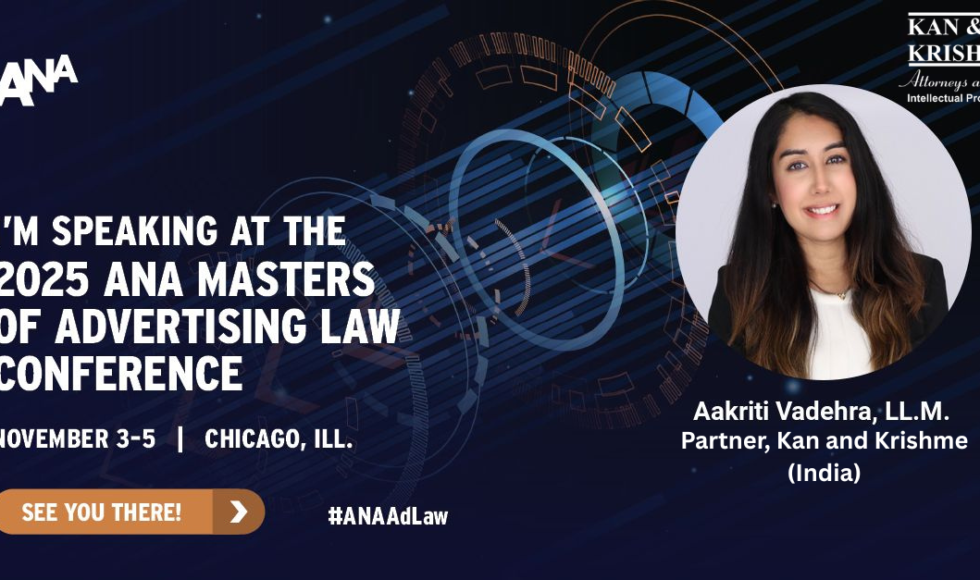Kan and Krishme to Attend 2025 ANA Advertising Law Conference in Chicago Kan and Krishme is proud to announce that Aakriti Vadehra, Partner, shall be attending the 2025 ANA Advertising Law Conference in Chicago from November 3-5, 2025. While there, she shall also be speaking at the panel “Preparing for the World Cup” which will […]
Kan and Krishme to Attend AIPLA 2025 Annual Meeting in Washington, D.C. Kan and Krishme is pleased to announce that Aakriti Vadehra, Partner, will represent the Firm at the AIPLA 2025 Annual Meeting, to be held in Washington, D.C. from October 30 to November 1, 2025, at the Gaylord National Resort and Convention Center. Hosted […]
Kan and Krishme to Attend FICPI World Congress 2025 in Naples Kan and Krishme, one of India’s premier intellectual property law firms, is pleased to announce its participation in the upcoming FICPI World Congress & Executive Committee Meeting, scheduled to take place in Naples, Italy, from 12–17 October 2025. The event, organized by the International […]
Kan and Krishme to Attend AIPPI World Congress 2025 in Yokohama Kan and Krishme, a leading intellectual property law firm in India, is proud to announce its participation in the 2025 AIPPI World Congress, to be held in Yokohama, Japan, from 13–16 September 2025. The firm will be exhibiting at Booth #13. This year’s Congress […]
Aakriti Vadehra of Kan and Krishme Speaks at the AIPPI Young Members Summit 2025 Kan and Krishme is proud to announce that Aakriti Vadehra, Partner at the firm, was invited to speak at the Young AIPPI Members Summit 2025, held virtually on July 9, 2025. Aakriti addressed a global audience of early-career IP professionals in […]
Kan and Krishme to Attend AIPLA 2025 Spring Meeting in Minneapolis Kan and Krishme is pleased to announce that Aakriti Vadehra, Partner, will represent the Firm at the AIPLA Spring Meeting 2025. The event will be held at the Hilton Minneapolis, Minnesota, USA, from May 13 to 15, 2025. Organized by the American Intellectual Property […]
Kan and Krishme Announces Participation in Prestigious Webinar on Global Advertising Law: Year in Review Kan and Krishme is proud to announce that Ms. Aakriti Vadehra, Designated Partner at the firm, will be speaking at the much-anticipated Global Advertising Law: Year in Review webinar, hosted by the Practising Law Institute (PLI). Scheduled for January 16, […]
Kan and Krishme Announces Kanu Priya’s Participation in GALA’s Global Advertising Law: Year in Review Webinar Kan & Krishme is proud to announce that Kanu Priya, Senior Partner at the firm, will be speaking at the Global Advertising Law: Year in Review webinar, hosted by the Global Advertising Lawyers Alliance (GALA). The webinar is scheduled […]
Kan and Krishme to Participate in the 76th APAA Council Meeting in Manila Kan and Krishme, a leading intellectual property law firm in India, is excited to announce its participation in the 76th Council Meeting of the Asian Patent Attorneys Association (APAA), which will take place in Manila, Philippines, from November 18-21, 2024. Representing Kan […]
Kan & Krishme to Attend 2024 AIPPI World Congress in Hangzhou Kan and Krishme is proud to announce its participation in the 2024 AIPPI World Congress, scheduled to take place in Hangzhou, China, from October 19-22, 2024. Representing Kan and Krishme at the event will be Sharad Vadehra, Managing Partner, and Aakriti Vadehra, LL.M., Designated […]










